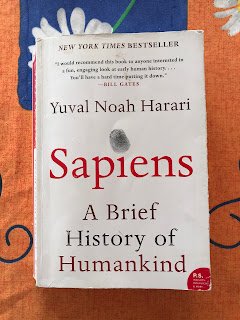I enjoyed reading Sapiens by Yuval Noah Harari, and I think it was a good time to read it. Reading anthropology gave me some perspective on otherwise crazy recent world events. Below are some of my favorite pieces of information from the book. I have not independently verified these facts, but I believe them to be accurate enough that I am willing to share them. I will update this blog if any of the facts presented are conclusively disproven by a trustworthy authority.
- Buddhism is older than Islam. Buddhism started 2,500 years ago. Islam 1,400. (Timeline of History)
- Chimpanzees are the closest human relative. (p. 5)
- Chimps spend 5 hours per day chewing food. Humans spend only 1 hour per day (thanks to cooking). (p. 12)
- The Indonesian island of Flores once had a species of dwarf people who got no bigger than 3.5 feet tall and 50 pounds. (p. 7)
- From about 2 million years ago until about 10,000 years ago, there were several different human species living on Earth at the same time. (p. 8)
- The brain accounts for 2-3% of your total body weight but consumes 25% of the body’s energy when the body is at rest. (p. 9)
- Eagles identify thermal columns rising from the ground and allow the air to lift them upwards. (p. 13)
- Humans are the only animal that engages in trade. (p. 35-36)
- The first humans in America encountered rodents the size of bears, oversized lions, giant ground sloths 20 feet tall and weighing 8 tons, mammoths and mastodons. Within 2,000 years humans killed most of them. (p. 70-72)
- On Madascar, elephant birds and giant lemurs both went extinct about the same time humans arrived on the island. Elephant birds were flightless, 10 feet tall and weighed almost 1/2 ton. (p. 72-73)
- In the early 19th century imperial Britain outlawed slavery and stopped the Atlantic slave trade. Slavery was gradually outlawed throughout the Americas in the following decades. This is was the first and only time in history a large number of slaveholding societies voluntarily abolished slavery. (p. 141-142)
- Tomatoes, chili peppers and cocoa are all from Mexico. They reached Europe and Asia only after the Spaniards reached Mexico. (p. 170)
- There were no horses in America in 1492. Horses were brought to America by Europeans. (p. 170)
- More than 90% of all money exists only on computer servers. (p. 178)
- The Aztec Empire was smaller than today’s Mexico. (p. 190-191)
- ”A person who does not crave cannot suffer.” (p. 226)
- Memes are cultural information units. (p. 242)
- Admitting ignorance made science more dynamic, supple and inquisitive. (p. 253) I believe that admitting ignorance makes a person more dynamic, supple and inquisitive as well.
- “The real test of knowledge is not whether it is true, but whether it empowers us.” (p. 259)
- Average life expectancy is around 80 in the developed world. (p. 269)
- Genetic engineers have successfully doubled the life expectancy of certain worms. (p. 270)
- A few serious scholars suggest that by 2050, some humans will become a-mortal (meaning they won’t die unless killed by an accident). (p. 271)
- The native population dropped by up to 90% upon European arrival to Australia and New Zealand. (p. 277)
- In 1775, Asia accounted for 80% of the world economy. India and China together accounted for 2/3 of the world’s total production. By 1950, Western Europe and the U.S. together accounted for 1/2 of the world’s economy and China’s share was reduced to 5%. (p. 280)
- Admitting ignorance is the beginning of learning. (see p. 284)
- Local Aztec enemies helped Cortez siege the Aztec Empire because they didn’t know they would fall under control of the greedy and racist Spanish regime which was far worse than the Aztecs. (p. 295)
- British imperial policies in Bangladesh caused a famine which killed 1/3 of the Bengali population (10 million people) in about 5 years. (p. 301-302)
- Culturalism is the new racism. You know longer say, ”it’s in their blood.” You say, ”it’s in their culture.” (p. 303)
- Capital flows into states which uphold the rule of law and private property. (p. 318-319)
- Indonesia was ruled by a private Dutch company (Vereenigde Oostindische Compagnie) for close to 200 years (around 1603 to around 1800). (p. 321-322).
- India was ruled by a private British company (British East India Company) for about 100 years until 1858. (p. 325)
- Hong Kong remained in British control until 1997. (p. 326)
- 70% of the African slaves imported to America worked on sugar plantations. (p. 330)
- Shares of slave trading companies were sold publicly on Dutch, English and French stock exchanges. (p. 331)
- The problem with free market capitalism is it cannot ensure that profits are made in a fair way or distributed fairly. (p. 331)
- Monkeys separated from their mothers were emotionally disturbed and suffered from high levels of anxiety and aggression. (p. 344-345)
- England was the first country to adapt a national timetable in 1847. (p. 354)
- In Medieval European cities there was typically a single, giant clock mounted on a high tower in the town square. (p. 354)
- 3rd world discontent is fomented by exposure to 1st world standards. (p. 384)
- People are only made happy by pleasant sensations in their bodies. Nothing else. (p. 386)
- “From a purely scientific standpoint, human life has absolutely no meaning.” (p. 391)


0 Comments